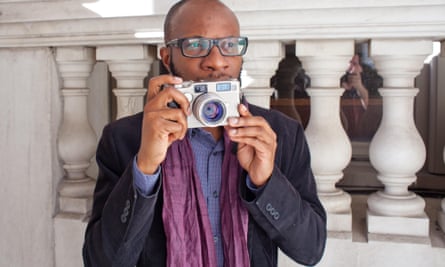The internet offers authors the next best thing to teleportation: the chance to connect with readers from almost anywhere, in real time. Many writers fall back on self-serving updates or retreat in fear like cats avoiding a cold bath, but a few are using the etherland as a canvas for experimentation and play. They have moved their storytelling, wit and insight from page to pixel, winning fans and readers in the process.
Neil Gaiman
Wander on to Neil Gaiman’s Tumblr or Twitter feed, and you’ll find he’s always up for a chat. The prolific British fantasy writer is a great democratiser, tearing down the walls between authors and readers and responding to weird and wonderful fan questions such as this one with the kind of enthusiastic advice you’d expect from a friend.
It’s clear Gaiman respects his readers as fellow creative souls, and his efforts pay off. When he’s working on a new project he can call on his trusty community to get involved. For A Calendar of Tales, a crowd-sourced story project, he tweeted a question for each month of the year then wrote a short story inspired by his favourite fan responses. If you want to be a boss author on the internet, Neil Gaiman is proof that the sharing better go both ways.
“I want to be an author when I grow up. Am I insane?” — powertothepencil
‘Yes. Growing up is highly overrated. Just be an author.’ — Neil Gaiman
Paulo Coelho
With his adages and affirmations, Paulo Coelho has crafted himself into the ruling mystic of an online empire. He’s also a great visual storyteller on Facebook and Instagram, sharing inspirational quotes with snapshots of his life and travels. While researching his latest book Adultery, his fans shared more than 1,000 emails with personal stories of infidelity. How many authors have earned that kind of trust? Steve Jobs saw social media as the intersection of humanity and technology. Stories are at the core of the human condition, and Coelho shows that literature can inhabit that place too.
Margaret Atwood
The Man Booker prize winner has said she always tries everything. She inhabits traditional and digital spaces with the same brilliance that her stories traverse real and speculative worlds. She’s an avid tweeter, known for bursts of creative inspiration such as designing superheroes inspired by her fan’s Twitter avatars. She is also an early adopter of digital publishing platforms Byliner and Wattpad. On Wattpad she collaborated with Naomi Alderman on a serialised zombie novel. She has since encouraged aspiring writers on the platform by running fan-fiction contests. Atwood shows that the key to building a broad community of ardent readers is to embrace and champion the changing publishing landscape, not shun it.
“Wattpad opens the doors and enlarges the view in places where the doors are closed and the view is restricted. And somewhere out there in Wattpadland, a new generation is testing its wings …” — Margaret Atwood
Teju Cole

The author of Open City takes inspiration from news stories, pop culture and history and reinterprets them for the web. While researching his forthcoming book Lagos he was drawn to local newspapers. This became a project titled Small Fates, a series of grimly ironic tweets based on news reports: “Wives are flammable, a police inspector, Wasiu, of Okokomaiko, has found.” Cole decided to publish Hafiz, a short story about an ailing homeless man, on Twitter. He “wanted the story to feel emergent,” so he asked friends to post different parts of the story then retweeted them in order to create the narrative.
Most recently, he worked on The Time of the Game, an artistic crowdsourcing idea that explored how different cultures viewed the World Cup final. He’s also a pretty great photographer, and you can find snaps from his travels on Flickr. Teju Cole’s digital projects make you stop, ponder and return again and again – akin to viewing an art exhibition. They’re a reminder that thought provoking stories can have longevity online.
Ursula K Le Guin
If you write something interesting on the net, someone will likely share it, even if it’s just your mum. If it’s controversial it might go viral. SF grand master Le Guin is the founder of Book View Café – a cooperative of writers taking digital publishing into their own hands by distributing it direct to readers. She’s also a candid blogger. Her post “Are they going to say this is fantasy?” about Kazuo Ishiguro’s new book, The Buried Giant, reignited the age-old war between literary and genre fiction. The web is full of readers who either embrace dragons or turn their noses up at them. Stirring that pot is guaranteed to generate discussion.
“I respect what I think he was trying to do, but for me it didn’t work. It couldn’t work. No writer can successfully use the ‘surface elements’ of a literary genre – far less its profound capacities – for a serious purpose, while despising it to the point of fearing identification with it. I found reading the book painful. It was like watching a man falling from a high wire while he shouts to the audience, ‘Are they going say I’m a tightrope walker?’”
Salman Rushdie
If you’re looking for the author of Midnight’s Children these days, you’ll likely find him in a heated debate on Twitter. He’s a vocal defender of freedom of expression, most recently regarding the boycott of PEN’s Charlie Hebdo award, which earned him comparisons to Voltaire. He’s also known for squabbles with other writers, famously telling Jonathan Franzen, who criticised Rushdie’s use of Twitter, to enjoy his ivory tower. His quick wit and satisfying unrestraint are what Twitter was made for, and it’s a combination that earns double points on the internet.
Gary Shteyngart

Looking into the eyes of Felix, Gary Shteyngart’s dachshund, causes a rise in oxytocin levels – which explains why dogs get so many shares on the web, and why Malcolm Gladwell said that emotion is contagious. In addition to posting cute pet pictures on Facebook and Instagram, the author of Little Failure brings the intoxicating satire of his books online.
When Shteyngart promotes his latest books, he does so palatably. Most book trailers are deadly dull – Shteyngart’s showcase the self-deprecating author up to his usual antics, and often include ridiculous cameos, such as James Franco in a pink dressing gown. Humour is a lifesaver for those invariable moments when an author has to toot their own horn.
Haruki Murakami
It’s never too late to get started. Earlier this year the attention-shy writer said: “After so long, I want to exchange emails with readers”. And so he became a literary agony uncle, with 40,000 questions and dilemmas submitted so far to Mr Murakami’s Place. His responses veer off on delicious tangents, just like his books. His Twitter feed, both in English and Japanese, is full of wise musings as well. Murakami is measured and thoughtful online, and a reminder that whatever you do on the web, you should make sure it’s authentic.
When one correspondent asked: “Do you think cats can understand how humans feel? My cat Bobo ran away when she saw me crying,” Murakami’s response was:
“I suspect that either you or your cat is extremely sensitive. I have had many cats, but no cat has ever been so sympathetic. They were just as egoistic as they could be.”
David Mitchell

Storytelling is as much about mastering the restraints of the format as it is about plot and characters. David Mitchell’s The Right Sort, a short story written specifically for Twitter, starts normally enough; but then we discover the protagonist has taken one of his mum’s Valium pills. The drug kicks in mid-story, and that’s when things get interesting. “Valium breaks down the world into bite-sized sentences. Like this one. All lined up. Munch-much.”
Veronica Roth
The author of the YA Divergent series curates a Tumblr called The Art of Not Writing, where she mixes writing tips and book-related updates with popular internet memes. She taps into the popularity of animated gifs to respond to fan questions and joins in on broader conversations on the web. The divide between literature and digital content is breaking down, and as the net generation grows up, the authors who understand this trend and find their voice within it are the ones to watch.

Comments (…)
Sign in or create your Guardian account to join the discussion